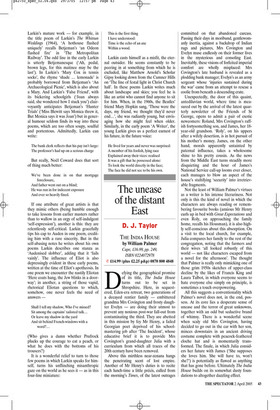The unease of the distant East
D. J. Taylor
THE INDIA HOUSE by William Palmer Cape, £16.99, pp. 249, ISBN 0224072978 ✆ £14.99 (plus £2.25 p&p) 0870 800 4848 Defying the geographical promise of its title, The India House turns out to be set in Shropshire. Here, in sequestered, Eden-era retreat, two generations of a decayed rentier family — embittered grandma Mrs Covington and frosty daughter Evelyn — are doing their utmost to prevent any noxious post-war fall-out from contaminating the third. They are abetted in this mission by fey Mr Henry, a failed Georgian poet deprived of his schoolmastering job after ‘The Incident’, whose educative brief it is to provide Mrs Covington’s grand-daughter Julia with a curriculum from which all traces of the 20th century have been removed.
Above this mirthless near-zenana hangs the penetrating scent of lost empire. Another of Mr Henry’s duties is to recite each lunch-time a little précis, culled from the morning’s Times, of the latest outrages committed on that abandoned carcass. Passing their days in moribund, gentlewomanly inertia, against a backdrop of Indian rugs and pictures, Mrs Covington and Evelyn muse endlessly on their former lives in the mysterious and consoling East. Inevitably, these visions of forfeited imperial comfort are wholly misplaced: Mrs Covington’s late husband is revealed as a plodding bank manager; Evelyn’s as an army sergeant whose ‘injuries sustained during the war’ came from an attempt to rescue a coolie from beneath a descending crate.
Unexpectedly, the door of this quaint, antediluvian world, where time is measured out by the arrival of the latest quarterly newsletter of the Friends of St George, opens to admit a pair of exotic newcomers: Roland, Mrs Covington’s raffish fortysomething son, and James, her 18year-old grandson. ‘Roly’, on his uppers after a wifely desertion, is in hot pursuit of his mother’s money. James, on the other hand, morals apparently untainted by paternal influence, takes a wholesome shine to his pretty cousin. As the news from the Middle East turns steadily more disquieting and the hour of James’s National Service call-up looms ever closer, each manages to blow an aspect of the house’s stultifying ‘security’ into irretrievable fragments.
Not the least of William Palmer’s virtues as a writer is his intense literariness. Not only is this the kind of novel in which the characters are always reading or remembering favourite books (anxious Mr Henry curls up in bed with Great Expectations and even Roly, on approaching the family home, recalls his Housman), it is also highly self-conscious about this absorption. On a visit to the local church, for example, Julia compares her family to the rest of the congregation, noting that the farmers and their wives ‘all looked robustly of this world — not like characters escaped from a novel for the afternoon’. The thought that Palmer is really only mimicking one of those grim 1950s sketches of upper-class decline by the likes of Francis King and Laura Talbot, in which everyone seems to hate everyone else simply on principle, is sometimes a touch overpowering.
All this suggests a conventionality which Palmer’s novel does not, in the end, possess. At its core lies a desperate sense of unease and the terror of great unknowns, together with an odd but seductive brand of whimsy. There is a wonderful scene when scaly old Mrs Covington, having decided to go out in the car with her son, minces downstairs in an ancient driving costume complete with peacock-feathered cloche hat and is momentarily transformed. The finale, in which Julia considers her future with James (‘She supposes she loves him. She will have to, won’t she?’) is potentially as flawed as anything that has gone before. Ultimately The India House builds on its somewhat dusty foundations to altogether dazzling effect.





























































 Previous page
Previous page